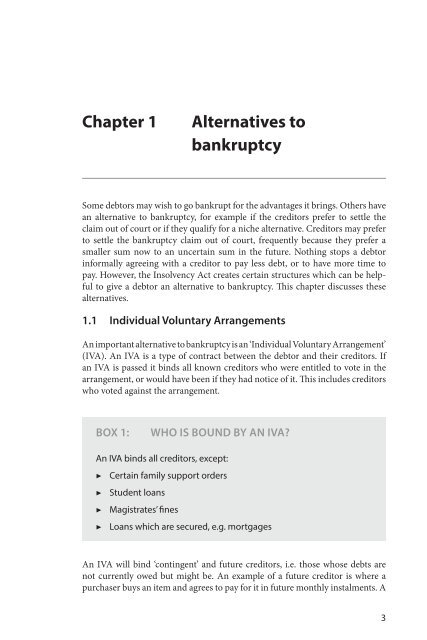Insolvency Made Clear: A Guide for Debtors
Plain English, practical guidance for anyone facing demands over a debt they are struggling to pay.
Plain English, practical guidance for anyone facing demands over a debt they are struggling to pay.
Create successful ePaper yourself
Turn your PDF publications into a flip-book with our unique Google optimized e-Paper software.
Chapter 1<br />
Alternatives to<br />
bankruptcy<br />
Some debtors may wish to go bankrupt <strong>for</strong> the advantages it brings. Others have<br />
an alternative to bankruptcy, <strong>for</strong> example if the creditors prefer to settle the<br />
claim out of court or if they qualify <strong>for</strong> a niche alternative. Creditors may prefer<br />
to settle the bankruptcy claim out of court, frequently because they prefer a<br />
smaller sum now to an uncertain sum in the future. Nothing stops a debtor<br />
in<strong>for</strong>mally agreeing with a creditor to pay less debt, or to have more time to<br />
pay. However, the <strong>Insolvency</strong> Act creates certain structures which can be helpful<br />
to give a debtor an alternative to bankruptcy. This chapter discusses these<br />
alternatives.<br />
1.1 Individual Voluntary Arrangements<br />
An important alternative to bankruptcy is an ‘Individual Voluntary Arrangement’<br />
(IVA). An IVA is a type of contract between the debtor and their creditors. If<br />
an IVA is passed it binds all known creditors who were entitled to vote in the<br />
arrangement, or would have been if they had notice of it. This includes creditors<br />
who voted against the arrangement.<br />
Box 1:<br />
WHO IS BOUND BY AN IVA?<br />
An IVA binds all creditors, except:<br />
▶ Certain family support orders<br />
▶ Student loans<br />
▶ Magistrates’ fines<br />
▶ Loans which are secured, e.g. mortgages<br />
An IVA will bind ‘contingent’ and future creditors, i.e. those whose debts are<br />
not currently owed but might be. An example of a future creditor is where a<br />
purchaser buys an item and agrees to pay <strong>for</strong> it in future monthly instalments. A<br />
3













